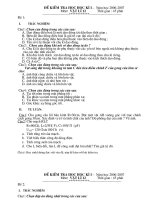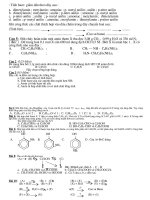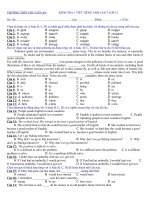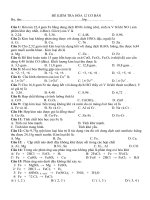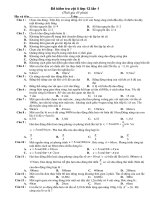- Trang chủ >>
- Văn Mẫu >>
- Văn Bản Mẫu
kiem tra lan 1 lop 12 tnghiem 9d tluan 1d
Bạn đang xem bản rút gọn của tài liệu. Xem và tải ngay bản đầy đủ của tài liệu tại đây (116.56 KB, 4 trang )
SỞ GD & ĐT THỪA THIÊN HUẾ
KIỂM TRA 1 TIẾT – LẦN 1 – HỌC KÌ I
TRƯỜNG THPT THỪA LƯU
MƠN: TIẾNG ANH - Thời gian: 45 phút
Full name:………………………………………………………………………
Class: …………
Mark the letter A, B, C or D on your answer sheet to indicate the word whose underlined part is
pronounced differently from that of the rest in each of the following questions from question 1 to question
2
Question 1: A. phones
B. coughs
C. students
D. makes
Question 2: A. changed
B. rugged
C. wretched
D. naked
Mark the letter A,B,C, or D on your answer sheet to indicate the word that differs from the rest in the
position of the main stress in each of the following questions from question 3 to question 4
Question 3: A. person
B. signal
C. instance
D. attract
Question 4: A. maintain
B. beauty
C. appearance
D. attractive
Mark the letter A, B, C or D on your answer sheet to indicate the correct answer to each of the following
questions from question 5 to question 26
Question 5: Members of our family have very close ______ with each other
A. share
B. confidence
C. relationship D. responsibility
Question 6: Since he__________ here, no one__________ him.
A. has left/saw
B. had left/saw
C. left/have seen
D. left/has seen
Question 7: When you ________here at this time tomorrow, I _________the room up.
A. will come/will be tidying B. come / will tidy C. come / will be tidying D. come / will have tidied
Question 8: He asked her_________
A. when did she leave that place
B. when does she leave that place
C. when she leaves that place
D. when she left that place
Question 9: A: “Do you need any help?” – B: “ ____________________.”
A. No, thanks. I can manage.
B. I haven’t got a clue.
C. That’s all for now
D. That’s fine by me.
Question 10: "Cigarette?" he asked. "No, thanks." I said.
A. He asked for a cigarette, and I immediately refused. B. He mentioned a cigarette, so I thanked him.
C. He offered me a cigarette, but I promptly declined D. He asked if I was smoking, and I denied at on
Question 11: John began playing the piano 10 years ago
A. John played the piano 10 years ago.
B. John has played the piano for 10 years.
C. John used to play the piano 10 years ago.
D. John doesn't play the piano anymore
Question 12: My father hasn’t smoked cigarettes for a month.
A. It’s a month since my father last smoked cigarettes.
B. It’s a month ago that my father smoked cigarettes.
C. It’s a month that my father hasn’t smoked cigarettes.
D. It’s a cigarette that my father smoked a month ago.
Question 13: A: “You look nice today. I like your new hairstyle.” B:“______________________.”
A. It’s nice of you to say so.
B. Shall I? Thanks.
C. Oh well done!
D. I feel interesting to hear that.
Question 14: Hurry up, or they ______ serving meals by the time we get to the restaurant.
A. stopped
B. are stopping
C. will have stopped
D. would stop
Question 15: The wedding day was ______________ chosen by the parents of the groom.
A. careless
B. careful
C. carelessly
D. carefully
Question 16: I often assume the responsibility _______ taking out the garbage and washing the clothes.
A. for
B. with
C. through
D. towards
Question 17: Ask her to come and see me when she _______ her work.
A. finish
B. has finished
C. finished
D. finishing
Question 18: Children need a ______ environment.
A. caring
B. obedient
C. responsible
D. possible
Question 19: Last night at this time, while Dave ______ , Sophie ________ the newspaper.
A. is cooking / is reading
B. was cooking / was reading
C. has cooked / is reading
D. was cooking /read
Question 20: I was angry when you saw me because I ______ with my sister.
A. have been arguing
B. had been arguing
C. argued
D. would argue
Question 21: The doctor has advised ____________ too much coffee.
A. me not drink
B. I don’t drink
C. me not drinking
D. me not to drink
Question 22: John’s career as a television presenter began five years ago.
A. John has been worked as a television presenter for five years.
B. John worked as a television presenter for five years.
C. John has worked as a television presenter for five years.
D. John has worked as a television presenter since five years.
Question 23: “How beautiful the dress you have just bought is!” Peter said to Mary.
A. Peter promised to buy Mary a beautiful dress.
B. Peter said thanks to Mary for her beautiful dress.
C. Peter complimented Mary on her beautiful dress.
D. Peter asked Mary how she had just bought her beautiful dress.
Question 24: They asked me __________ in Los Angeles then.
A. whether was my father working
B. if my father was working
C. whether my father had been working
D. was my father working
Question 25: While her brother was in the army, Sarah ___________ to him twice a week.
A. was writing
B. wrote
C. has written
D. had written
Question 26: Most doctors and nurses have to work on a _______ once or twice a week at the hospital.
A. solution
B. night shift
C. household chores
D. special dishes
Mark the letter A, B, C or D on your answer sheet to show the underlined part that needs correction from
question 27 to question 30
Question 27: It’s the first time I saw this film
Question 28: They asked me that I could do the shopping for them.
Question 29: Have you finished reading the magazine which I lend you two weeks ago?.
Question 30: We have written to each other when we were in primary school.
Read the following passage and mark the letter A, B, C or D on your answer sheet to indicate the correct
answer to each of the questions from question 31 to question 35.
In the past, both men and women were expected to be married at quite young ages. Marriages were
generally arranged by parents and family, with their children having little chance to say no in the matter. In
the past it was not surprising to find that a bride and groom had only just met on the day of their engagement
or marriage.
In modern Vietnam, this has changed completely as people choose their own marriage-partners based on
love, and in consideration primarily to their own needs and wants. Moreover early marriage is quite illegal.
The traditional Vietnamese wedding is one of the most important of traditional Vietnamese occasions.
Regardless of westernization, many of the age-old customs practiced in a traditional Vietnamese wedding
continue to be celebrated by both Vietnamese in Vietnam and overseas, often combining both western and
eastern elements. Besides the wedding ceremony, there is also an engagement ceremony which takes place
usually half a year or so before the wedding. Due to the spiritual nature of the occasion, the date and time of
the marriage ceremony are decided in advance by a fortune teller. The traditional Vietnamese wedding
consists of an extensive array of ceremonies: the first is the ceremony to ask permission to receive the bride,
the second is the procession to receive the bride (along with the ancestor ceremony at her house), the third is
to bring the bride to the groom's house for another ancestor ceremony and to welcome her into the family,
then the last is a wedding banquet. The number of guests in attendance at these banquets is huge, usually in
the hundreds. Several special dishes are served. Guests are expected to bring gifts, often money, which the
groom and bride at one point in the banquet will go from table to table collecting.
Question 31: In the past, _________.
A. Vietnamese couples were free to make a decision on the marriage
B. Vietnamese marriage was decided by parents and family
C. getting married at an early age was not allowed
D. parents had no right to interfere their children's marriage
Question 32: In former days, the fact that a bride and groom had only first met just on the day of their
engagement or marriage was _________.
A. surprising
B. uncommon
C. popular
D. strange
Question 33: Which sentence is referred Vietnamese modern marriage?
A. Most young people do not have their marriage based on love.
B. All marriages are arranged by parents and family.
C. Marriage is quite westernization.
D. Couples do not get married at quite young ages.
Question 34: According to the passage, __________.
A. Oversea Vietnamese people do not like to organize a traditional wedding
B. There is an engagement ceremony which takes place usually half a year or so before the wedding
C. Many of the age-old customs practiced in a traditional Vietnamese wedding do not exist nowadays
D. Vietnamese people never ask a fortune teller the date and time of the marriage ceremony
Question 35: Which does not exist in a Vietnamese wedding party?
A. firecrackers
B. guests
C. dishes
D. gifts
---------------------TEST 2-----------------------Choose the word which is stressed differently from the rest.
1. A. attract
B. maintain
C. attitude
D. assistance
2. A. verbal
B. obedient
C. mischievous
D. sacrifice
3. A. precede
B. oblige
C. marriage
D. reject
Choose the word which is stressed differently from the rest.
4. A. cooks
B. loves
C. joins
D. spends
5. A. sacrificed
B. trusted
C. recorded
D. acted
6. A. bride
B. fridge
C. bridge
D. driven
Choose A, B, C, or D that best completes each unfinished sentence.
7. Billy, come and give me a hand with cooking.
A. help
B. prepared
C. be busy
D. attempt
8. Professor Berg was very interested in the diversity of cultures all over the world.
A. variety
B. changes
C. conservation
D. number
9. Body language is a potent form of _______ communication.
A. verbal
B. non-verbal
C. tongue
D. oral
10. Many young people have objected to ____ marriage, which is decided by the parents of the bride and
groom.
A. agreed
B. shared
C. contractual
D. sacrificed
11. You are not _______ to say anything unless you wish to do so.
A. obliged
B. willing
C. equal
D. attracted
12. Most doctors and nurses have to work on a _______ once or twice a week at the hospital.
A. solution
B. night shift
C. household chores
D. special dishes
13. I like doing _______such as cooking, washing and cleaning the house.
A. house-keeper
B. white house
C. lord of house
D. household chores
14. Our teacher often said, "Who knows the answer? _______ your hand."
A. Rise
B. Lift
C. Raise
D. Heighten
15. Children who are isolated and lonely seem to have poor language and ________.
A. communicate
B. communication
C. communicative
D. communicator
16. The lecturer explained the problem very clearly and is always _______ in response to questions.
A. attention
B. attentively
C. attentive
D. attentiveness
17. I believe that he was concerned ______ all those matters which his wife mentioned.
A. with
B. over
C. upon
D. above
18. Affected by the Western cultures, Vietnamese young people's attitudes _______ love and marriage have
dramatically changed.
A. for
B. with
C. through
D. towards
19. John asked me _______ in English.
A. what does this word mean
B. what that word means
C. what did this word mean
D. what that word meant
20. Laura said she had worked on the assignment since _______.
A. yesterday
B. two days ago
C. the day before
D. the next day
21. John asked me _______ interested in any kind of sports.
A. if I were
B. if were I
C. if was I
D. if I was
22. John asked me _______ that film the night before.
A. that I saw
B. had I seen
C. if I had seen
D. if had I seen
23. A woman can never have a happy married life without _______ her husband.
A. demanding
B. agreeing
C. trusting
D. determining
24. What an attractive hair style you have got, Mary! - _______
A. Thank you very much. I am afraid
B. You are telling a lie
C. Thank you for your compliment
D. I don't like your sayings
25. I _______ a terrible accident while I _______ on the beach
A. see / am walking
B. saw / was walking
C. was seeing / walked
D. have seen / were walking
26. The Titanic _______ the Atlantic when it _______ an iceberg.
A. was crossing / struck
B. had crossed / was striking
C. crossed / had struck
D. is crossing / strikes
27. By the time we _______ to the train station, Susan _______.
A. will get / has been left B. got / was leaving C. got / had left
D. get / will leave
28. We _______ touch three years ago.
A. lost
B. have lost
C. loses
D. were losing
Choose the underlined word or phrase in each sentence that needs correcting.
29. My responsibility is to wash dishes and take off the garbage.
30. When Helen was a child, she has worked in a factory for more than three years.
31. After Mrs. Wang had returned to her house from work, she was cooking dinner.
32. I don't know why is the elevator not working properly today.
Read the passage carefully and choose the correct answer.
My aunt is one of those people who can talk to anyone about anything. If she goes to a party
where she doesn't know any of the people, she just walks up to the first person that she sees and
introduces herself. And yet she doesn't seem to talk about deeply important things like politics or
religion. She always starts off with something very obvious like the other person's job. Very soon
she's talking as if she's known the other person for years. I asked her once what her secret was. She
said that the most important thing in a conversation was listening. People love to talk about
themselves, so if you allow them to do so, it's very easy to keep a conversation going. You have to
listen very carefully and ask questions. And you have to look interested, too. So don't keep looking at
other things in the room while you're talking to someone.
Another thing that I've noticed is that she only pays people compliments. She says: 'I like your
hair. Which hairdresser do you go to?' or 'You look very well. Have you. been on holiday?' Friendly
messages like this seem to provide an easy way into a conversation.
33. According to my aunt, the most important thing in a conversation was__________________.
A. speaking
B. discussing
C. looking
D. listening
34. At parties where she does not know anybody, my aunt· normally
A. feels embarrassed and stays away from people
B. asks people to introduces themselves to her
C. comes over to the first person and introduces herself
D. sits alone and avoids talking to other people
35. My aunt thinks that it's very easy to keep a conversation going if you_________________
A. let people talk about themselves
B. let people hear about yourself
C. talk about politics or religion
D. ask people about their secrets
36. What should you NOT do when you have a conversation with someone?
A. Looking very interested in his or her story
B. Looking at other things in the room
C. Listening very carefully and asking questions D. Paying him or her compliments
Fill in each numbered blank with one suitable word or phrase.
In Japan, politeness and good manners are very important and business meetings are very
formal. Business cards are also important and they (37)____________these at the beginning of a
meeting. They always look at them carefully, so you should do the same as they might think you're
rude if you don't. A lot of communication is non-verbal. They are very good listeners and may ask a
lot of questions to (38)_______they understand everything. In a conversation they wait longer
before they reply than westerners do, so it's important not to speak in those long pauses but to wait
for their reply. In their culture it's rude to ask direct questions or to say 'No' or 'I disagree'. In
business it takes a long time to (39)___________a decision because they have to ask everyone in
the company. When they say 'Yes' it may mean 'I understand', not 'I agree', and when they smile it
might be because they don't know (40) __________ to say. _______________
37. A. exchange
B. change
C. purchase
D. barter
38. A. find
B. notice
C. check
D. identify
39. A. get
B. make
C. take
D. gain
40. A. when
B. that
C. who
D. what
